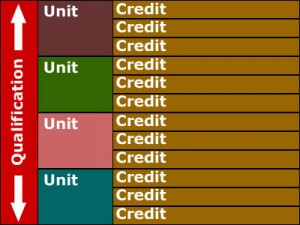 Qualifications Credit Framework (QCF)
Qualifications Credit Framework (QCF)
What is the QCF?
It’s the new framework for creating and accrediting qualifications in England, Wales and Northern Ireland.
It will give a wider range of learners the opportunity to get the qualifications they need, in a way that suits them. QCF qualifications are designed with the help of employers so learners can be assured that they’re gaining skills that employers are looking for.
The QCF:
- recognises smaller steps of learning and enables learners to build up qualifications bit by bit;
- helps learners achieve skills and qualifications that meet industry needs;
- enables work-based training to be nationally recognised.
Information Guides:
- An introduction to the Qualifications and Credit Framework;
- A Learners Guide to the Qualifications and Credit Framework;
Qualifications and Curriculum Authority (QCA), the Learning and Skills Council (LSC) and Ofqual implemented the new QCF in England in 2008 following two years of tests and trials.
QCA has now become the QCDA or Qualifications and Curriculum Development Authority.
All qualifications in the QCF are built up from smaller units of learning. Every unit and qualification has a credit value and a level. The credit value represents how long it will take and the level represents the level of difficulty, from Entry level to level 8.

All the units in the QCF can be assessed individually and allows for cross-referencing of evidence to allow work to be assessed for more than one unit at the same time.
Qualification Sizes
There are three (3) sizes of qualifications in the QCF and each ‘credit’ equates to approximately 10 hours of learning:
- Award:
- 1 to 12 credits – 10 to 120 hours of learning;
- Certificate:
- 13 to 36 credits – 130 to 360 hours of learning;
- Diploma:
- 37 credits or more – 370 or more hours of learning;
Qualification titles
Each qualification title contains the following:
- the level of the qualification – (from Entry level to level 8);
- the size of the qualification – (Award/Certificate/Diploma);
- details indicating the content of the qualification;
The QCF is a regulated framework. Ofqual is responsible for regulating the framework, together with its partner regulators in Wales (the Department for Children, Education, Lifelong Learning and Skills or DCELLS) and Northern Ireland (the Council for the Curriculum, Examinations and Assessment or CCEA).
| Main stages of education/employment | Qualifications and Credit Framework/National Qualifications Framework for England, Wales and Northern Ireland* www.ofqual.gov.uk |
||
| Level | |||
| Professional or postgraduate education, research or employment | 8 | Vocational Qualifications Level 8 | |
| 7 | Fellowships, NVQ Level 5, Vocational Qualifications Level 7 |
||
| Higher education Advanced skills training |
6 | Vocational Qualifications Level 6 | |
| Entry to professional graduate employment | |||
| 5 | NVQ Level 4, Higher National Diplomas, (HND), Higher National Certificates (HNC), Vocational Qualifications Level 5 |
||
| Specialised education and training | 4 | Vocational Qualifications Level 4 | |
| Qualified/Skilled worker Entry to higher education Completion of secondary education |
3 | NVQ Level 3, Vocational Qualifications Level 3, GCE AS and A Level, Advanced Diplomas |
|
| Progression to skilled employment Continuation of secondary education |
2 | NVQ Level 2, Vocational Qualifications Level 2, GCSEs at grade A*-C, ESOL skills for life, Higher Diplomas, functional skills Level 2 (English, mathematics & ICT) |
|
| Secondary education Initial entry into employment or further education | 1 | NVQ Level 1, Vocational Qualifications Level 1, GCSEs at grade D-G, ESOL skills for life, Foundation Diplomas, functional skills Level 1 (English, mathematics & ICT) |
|
| Qualifications can be taken at any age in order to continue or return to education or training | Entry Level | Entry Level Certificates (sub levels 1-3), ESOL skills for life, functional skills, Entry Level (English, mathematics & ICT) |
|
* The Qualifications and Credit Framework (QCF) is replacing the National Qualifications Framework (NQF).

